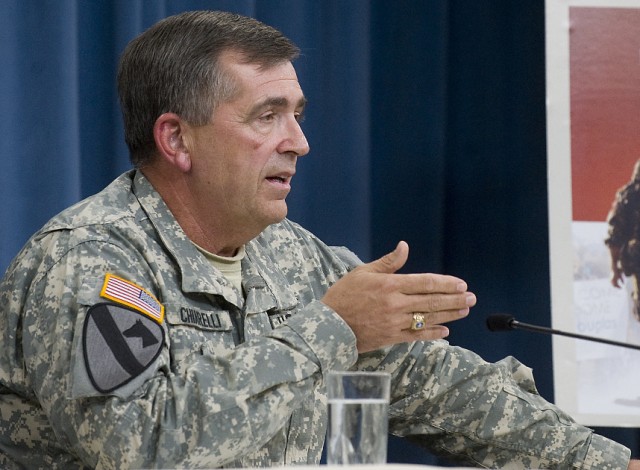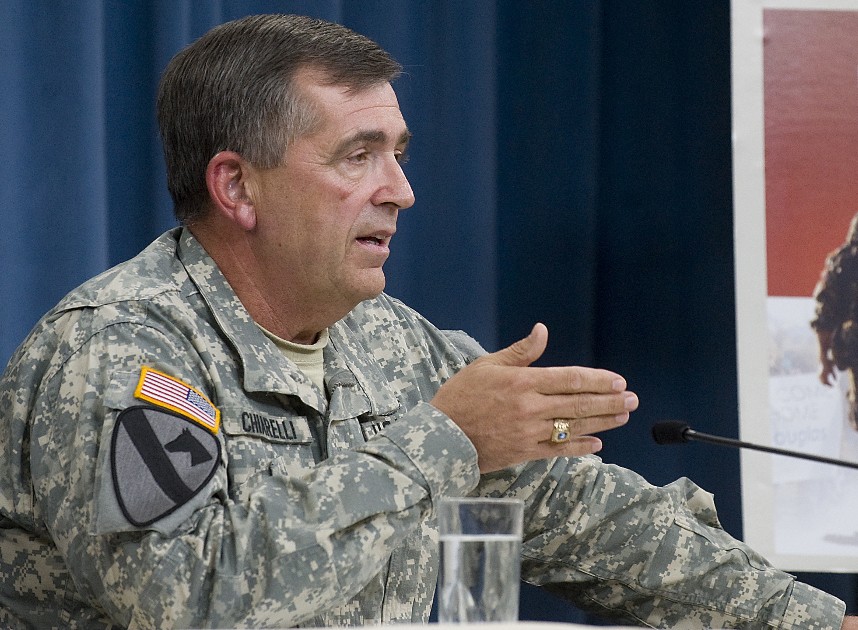WASHINGTON, May 12, 2011 -- The therapies used for the treatment of brain injuries lag behind the advanced medical science employed for treating mechanical injuries, such as missing limbs, Army Vice Chief of Staff Gen. Peter W. Chiarelli told reporters here today at the Defense Writers Group breakfast.
Chiarelli said more work must be done to properly diagnose and treat servicemembers suffering from post-traumatic stress disorder, traumatic brain injury and suicidal thoughts.
"There's a lot of criticism with how we handle PTSD and TBI and other behavioral health issues," he said. "I think a lot of that is unfair, because if you study this, we don't know as much about the brain. That is the basis of the problem."
Meanwhile, Chiarelli said, the stigma that some servicemembers associate with actively seeking treatment for mental health issues is still active.
"Breaking the stigma of mental health issues is the hardest part," the general acknowledged.
Chiarelli said military medicine has been very successful in replacing injured servicemembers' lost arms and limbs with high-tech prosthetic devices in tandem with rehabilitation training.
"None of you has asked what we're able to do with Soldiers who lose arms and legs," Chiarelli told reporters. "I've been using my bully pulpit in the last year or so to say that as an agency we do everything we can to understand the brain as we do the rest of the body."
Chiarelli said progress has been made in diagnosing and treating PTSD and TBI, though he acknowledged that much work remains.
"We're beginning to get some traction," Chiarelli said of new information provided by recent studies of PTSD and TBI issues. The general said he's "harkened" by the Army and National Mental Health Institute all-Soldier study of PTSD and TBI, now into its third month.
"We're starting to get back some data," he said. "I feel good about it."
The study starts with monitoring new trainees -- a process that has never been done before, the general said. The Army study, he added, will track Soldiers during their careers to monitor them for potential risks.
"Our hope is we'll get algorithms," Chiarelli said, "and will be able to tell someone: 'You're at a higher risk of developing some kind of behavior health issue and this is what you ought to do about it.'"
Traumatic brain injuries that occur in combat are difficult to identify, the general said, because the majority of cases are caused by a blast, where the servicemember's head usually doesn't collide with the ground or any hard surface to produce a tell-tale wound. Therefore, Chiarelli said he wants to develop the ability to collect data on combat explosions inside vehicles to have a basis to better understand blast injuries to the brain.
Chiarelli said studies show that blasts occurring inside a military vehicle can result in an 11-percent chance for occupants losing a limb; a 65-percent chance for occupants developing PTSD or TBI, and a 16 to 17 percent chance of occupants suffering a brain injury.
The Army hopes to develop a tracking system for brain injuries, the general said, that's similar to methods used to identify and track diseases that occur in organs such as the heart.
"That's what we don't fully understand," he said. "We don't know at what level that [injury] occurs and we need to find that out."
Injured servicemembers with PTSD or TBI may feel fine initially, but the symptoms will eventually emerge, the general said.
"When a Soldier comes back from war, he might look exactly the same and act the same, but after two weeks or so, the signs start to show up," Chiarelli said. "He goes to the doctor and says 'fix it,' and the doctor can't fix it. It's got to be the most frustrating thing in the world. That's what we're faced with."
The Army also is working with the Department of Veterans Affairs to aid veterans experiencing PTSD, TBI and other issues, he said.
"We are working closely with the VA in ways we've never worked before," Chiarelli said. "We're working on how to improve the disability evaluation process, and lessons learned -- what's working and what's not working."
Meanwhile, he said, military health care providers "need to do a better job of screening , with [better] science that has some kind of certainty to make the proper diagnosis and [prescribe the best] treatment."
Related Links:
Study addresses suicide prevention efforts
Vice Chief discusses relieving stress on force
Army vice chief gets 'Hero of Medicine' award
STAND-TO!: Traumatic Brain Injury
Defense Centers of Excellence for Psychological Health and Traumatic Brain Injury


Social Sharing